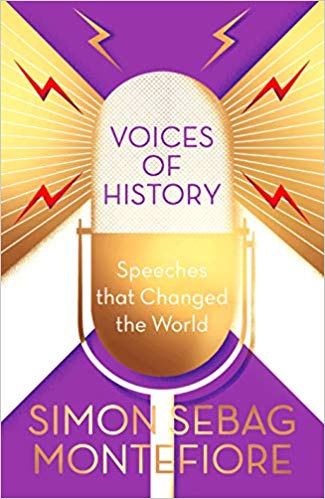“Voices of History: Speeches that Changed the World” by Simon Sebag Montefiore
When a historian such as Simon Sebag Montefiore who is also a brilliant public lecturer/ performer, puts together a collection of speeches that changed the world, then it is best to read the book. Regularly giving public engagements, ranging from lectures to conversations and performances such as dramatised readings of extracts from his last book — Letters that Changed the World, it is amply clear how crisply he selects and contextualises the speeches in his recent book Voices of History: Speeches that Changed the World.

He apologises to the purists but admits to editing some of the longer speeches for brevity so that the general reader may enjoy them. Many such anthologies exist in the market and are useful in their own way but Voices of History is special for the selection and its horrifying relevance to modern times. It is as if Simon Sebag Montefiore has accurately picked up the undercurrents of his audiences and his various worldwide engagements and put together a selection of speeches that were pertinent when they were first read out and are sobering to read today. More importantly, like a true historian, to lay out the facts and let the reader judge, albeit with a little nudge in terms of the arrangement of the material. Take for instance the inclusion of the only two speeches in the “Genocide” section. Unsurprisingly both belong to the Nazis — Adolf Hitler on “The annihilation of the Jewish race in Europe” ( 30 January 1939) and Heinrich Himmler’s “The Jewish people are going to be exterminated” ( 4 October 1943). These are immediately followed by the next section on “Good vs Evil” where the first speech is by Elie Wiesel, Nobel Peace Prize winner and a survivor of the Auschwitz Birkenau camp. Wiesel spoke on “The perils of indifference” ( 12 April 1999) at a speech he gave at the White House before President Bill Clinton.
…What is indifference? Etymologically, the word means ‘no difference’.
A strange and unnatural state in which the lines blur between light and darkness, dusk and dawn, crime and punishment, cruelty and compassion, good and evil. What are its courses and inescapable consequences? Is it a philosophy? Is there a philosophy of indifference conceivable? Can one possibly view indifference as a virtue? Is it necessary at times to practise it simply to keep one’s sanity, live normally, enjoy a fine meal and a glass of wine, as the world around us experiences harrowing upheavals?
Of course, indifference can be tempting — more than that, seductive. It is so much easier to look away from victims. It is so much easier to avoid such rude interruptions to our work, our dreams, our hopes. It is, after all, awkward, troublesome, to be involved in another;s pain and despair. Yet, for the person who is indifferent, his or her neighbours are of no consequence. And, therefore, their lives are meaningless. Their hidden or even visible anguish is of no interest. Indifference reduces the other to an abstraction. …
This is a well-picked collection of speeches. Sobering reminders of recently past events that should not be forgotten.
12 October 2019
